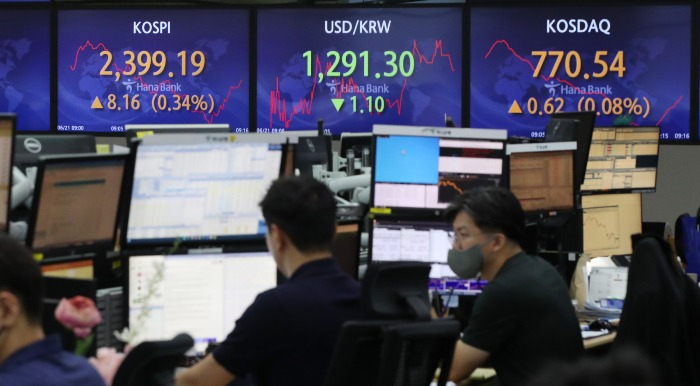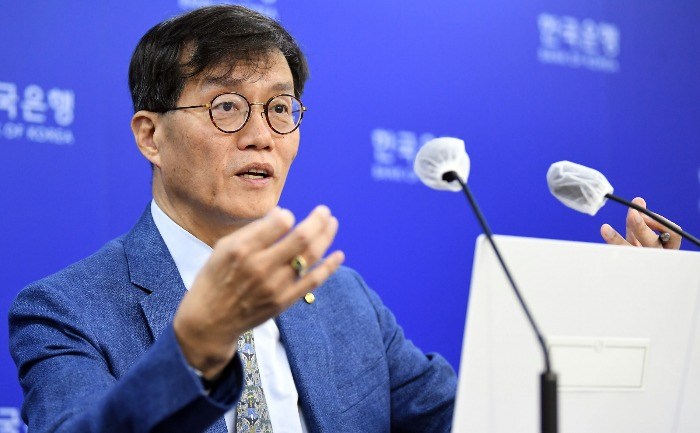Korean stock market
Foreign ownership of S.Korean stocks at 13-year low
The dollar/won rate hits its highest level in almost 13 years as the Kospi stock index tumbles to around a 2-year low
By Jun 21, 2022 (Gmt+09:00)
3
Min read
Most Read
LG Chem to sell water filter business to Glenwood PE for $692 million


KT&G eyes overseas M&A after rejecting activist fund's offer


Mirae Asset to be named Korea Post’s core real estate fund operator


StockX in merger talks with Naver’s online reseller Kream


Meritz backs half of ex-manager’s $210 mn hedge fund



Foreign investors’ stockholdings in South Korea have plunged to their lowest level in nearly 13 years, dealing a heavy blow to the domestic stock market and the Korean won.
As of June 17, foreign investors held a combined 30.83% of stocks listed on the Kospi market by value, down from around 35% since 2010, according to the Korea Exchange. The latest figure was the lowest level since Aug. 18, 2009 in the wake of the global financial crisis.
Foreign investors have sold a net 4.2 trillion won ($3.3 billion) in Kospi-listed shares since the start of this month as of June 20, reversing their net purchases of 523.8 billion won in the entire month of May.
So far this year, their net selling amounted to 13.5 trillion won on the Kospi.
Behind their continuous sell-offs were the growing expectations of back-to-back US interest rate hikes next month, which would further strengthen the dollar and in turn reduce currency translation gains from the won-denominated assets.
Currently, South Korea’s benchmark interest rate is nearly on a par with the 1.5-1.75% range of the US interest rate. However, another 75-basis-point hike by the US Federal Reserve will likely widen the yield gap between the two countries, which would further raise the attractiveness of the US assets.
The dollar firmed to 1,292.4 against the Korean won on Monday, its strongest level since mid-July 2009 and compared to 1,191.8 early this year. The dollar/won rate could further soften to the 1,300 level in the second half of this year, analysts said.
“There’s no doubt that South Korean stocks are being traded at low valuations,” said Samsung Securities’ senior analyst Jung Myung-ji.
“But foreign investors will turn net buyers of South Korean stocks only after there are clear signs of exports growth and stabilizing raw materials costs.”
The benchmark Kospi index on Monday plunged to its lowest level in more than one and a half years, its weakest level since Nov. 4, 2020.

SAMSUNG SHARES
On Monday, Samsung Electronics Co., South Korea’s largest stock by market cap, saw its share price falling to as low as 58,100 won, its lowest point since late October 2020. Later in the day, it closed down 1.84% at 58,700 won.
Shares of the world’s top memory chip and smartphone brand have lost about 25% since the start of this year as a looming economic downturn is expected to cut demand for its semiconductor chips and electronic gadgets.
Samsung Electronics accounted for about 40% of foreign net selling of 665.3 billion won on Monday.
Since early this year, foreign investors have dumped a net 8.3 trillion won worth of Samsung Electronics shares as of Monday, pulling foreign ownership of the stock lower to 49.9%, its lowest level in six years.
Analysts lowered their forecasts for Samsung Electronics’ operating profit, reflecting the bearish outlook for the electronics product market, despite their revised estimates are still higher than that of last year's 51.6 trillion won.
Eugene Investment & Securities reseach head Lee Seung-woo said the current share price of Samsung Electronics is traded at one or 1.2 times its book value, pricing in a 20% drop on-year in its operating profit next year.
The multiple could decline further to 1.07, or the level during the 2008-9 global financial crisis, which will likely drive the Kospi index down to the 2,300-point threshold from the current 2,400-point level.
Write to Sung-Mi Shim and Tae-Ung Bae at smshim@hankyung.com
Yeonhee Kim edited this article
More to Read
-
 Central bankBOK may take big-step rate hike on Fed's aggressive tightening
Central bankBOK may take big-step rate hike on Fed's aggressive tighteningJun 16, 2022 (Gmt+09:00)
3 Min read -
 EarningsSamsung’s stock underlines cloudy outlook despite record Q1
EarningsSamsung’s stock underlines cloudy outlook despite record Q1Apr 28, 2022 (Gmt+09:00)
4 Min read
Comment 0
LOG IN


